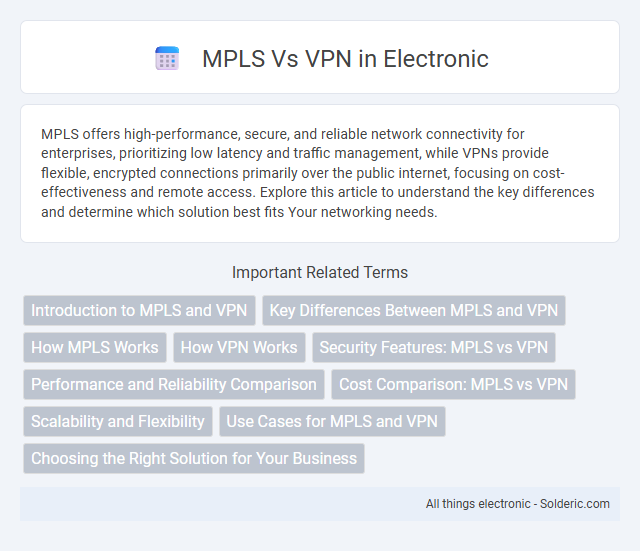MPLS offers high-performance, secure, and reliable network connectivity for enterprises, prioritizing low latency and traffic management, while VPNs provide flexible, encrypted connections primarily over the public internet, focusing on cost-effectiveness and remote access. Explore this article to understand the key differences and determine which solution best fits Your networking needs.
Comparison Table
| Feature | MPLS (Multiprotocol Label Switching) | VPN (Virtual Private Network) |
|---|---|---|
| Definition | High-performance routing technique using labels to direct data. | Secure connection over public or private networks via encryption. |
| Security | Private network with inherent isolation; less encryption needed. | Encrypts data to secure transmission over public internet. |
| Performance | Low latency, high reliability with Quality of Service (QoS) support. | Dependent on internet speed; potential latency and jitter. |
| Cost | Higher operational costs due to dedicated infrastructure. | Lower cost using existing internet infrastructure. |
| Scalability | Highly scalable for large enterprise networks. | Scalable but may require complex configuration for large networks. |
| Use Case | Enterprise WANs requiring reliable, fast connections. | Remote access and secure connections over public networks. |
Introduction to MPLS and VPN
Multiprotocol Label Switching (MPLS) is a high-performance telecommunications protocol that directs data from one node to the next based on short path labels rather than long network addresses, optimizing traffic flow and reducing latency. Virtual Private Network (VPN) technology creates secure, encrypted connections over public networks, ensuring data privacy and remote access for users. MPLS is widely used by enterprises for efficient, reliable wide-area network (WAN) connectivity, while VPNs are favored for secure remote access and protecting data communications over the internet.
Key Differences Between MPLS and VPN
MPLS (Multiprotocol Label Switching) provides a private, high-performance network with fixed routing paths and guaranteed Quality of Service (QoS), making it ideal for real-time applications. VPN (Virtual Private Network) uses encryption to secure data over public internet connections, offering cost-effective flexibility but potentially variable performance due to shared infrastructure. Your choice depends on whether reliability and low latency are priorities (MPLS) or if budget and remote access are more critical (VPN).
How MPLS Works
MPLS (Multiprotocol Label Switching) works by assigning fixed-length labels to packets, enabling efficient and predetermined data forwarding across a network without relying on traditional IP routing tables. This label-based switching directs packets through pre-established paths called Label Switched Paths (LSPs), ensuring low latency and high-quality service delivery typical in enterprise WANs. The technology supports traffic engineering and quality of service (QoS) by prioritizing packets based on labels, making MPLS ideal for performance-critical applications compared to VPNs.
How VPN Works
A Virtual Private Network (VPN) creates a secure, encrypted tunnel between a user's device and a remote server, ensuring data privacy over public or shared networks. By encapsulating and encrypting data packets, VPNs protect information from interception and unauthorized access while masking the user's IP address for anonymity. VPN protocols such as OpenVPN, IKEv2, and WireGuard maintain strong security standards, making VPNs essential for remote access and secure internet browsing.
Security Features: MPLS vs VPN
MPLS offers robust security through its private network infrastructure, isolating your data from public internet traffic and minimizing exposure to external threats. VPNs secure data by encrypting it over public networks, providing flexible access but potentially increasing vulnerability to cyberattacks if encryption protocols are weak. Your choice between MPLS and VPN depends on the level of security needed and the network environment involved.
Performance and Reliability Comparison
MPLS offers superior performance with low latency and guaranteed bandwidth by prioritizing traffic through dedicated circuits, ensuring reliable and consistent data flow. VPNs rely on public internet infrastructure, which may introduce variable latency and potential congestion, impacting performance during peak times. For your business-critical applications, MPLS provides enhanced reliability through built-in redundancy and service-level agreements (SLAs) that VPNs typically cannot match.
Cost Comparison: MPLS vs VPN
MPLS typically incurs higher costs due to dedicated network infrastructure and guaranteed performance levels, making it ideal for businesses requiring consistent, low-latency connections. VPNs leverage the public internet, offering a more cost-effective solution with flexible scalability but potentially variable performance and security depending on your configuration. Choosing between MPLS and VPN hinges on balancing budget constraints with your organization's need for reliability and speed.
Scalability and Flexibility
MPLS networks offer high scalability by efficiently managing large volumes of traffic with predetermined paths, making them ideal for enterprises with extensive branch networks. VPNs provide greater flexibility by allowing secure, encrypted connections over public internet infrastructure, enabling quick deployment and easy adjustments to changing network demands. Your choice depends on whether you prioritize MPLS's robust scalability or VPN's adaptable, cost-effective flexibility.
Use Cases for MPLS and VPN
MPLS is ideal for large enterprises requiring reliable, high-performance connections for real-time applications such as voice, video conferencing, and data center interconnects with guaranteed SLA levels. VPNs are suited for remote access and smaller businesses needing secure, encrypted communication over the public internet without the higher costs of dedicated infrastructure. MPLS supports complex, multi-site networks with predictable latency, while VPNs provide flexible, cost-effective solutions for secure connectivity across diverse geographic locations.
Choosing the Right Solution for Your Business
MPLS offers high-speed, low-latency connectivity ideal for businesses requiring reliable performance and secure private networks across multiple locations. VPNs provide flexible, cost-effective remote access solutions using public internet, suitable for small to medium enterprises with less stringent performance needs. Evaluating factors such as network scalability, security requirements, budget constraints, and traffic prioritization helps determine whether MPLS or VPN best supports your business growth and operational efficiency.
MPLS vs VPN Infographic

 solderic.com
solderic.com